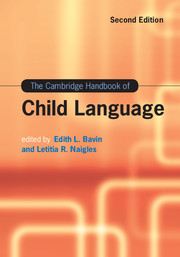

Slobin, Dan I. 2017. Social Environment and Cognition in Language Development. Vol. 21, Issue. , p. 3.
Vihman, Virve-Anneli 2018. Language Interaction in Emergent Grammars: Morphology and Word Order in Bilingual Children’s Code-Switching. Languages, Vol. 3, Issue. 4, p. 40.
Pigdon, Lauren Willmott, Catherine Reilly, Sheena Conti-Ramsden, Gina Gaser, Christian Connelly, Alan and Morgan, Angela T. 2019. Grey matter volume in developmental speech and language disorder. Brain Structure and Function, Vol. 224, Issue. 9, p. 3387.
Sperlich, Darcy 2020. Reflexive Pronouns: A Theoretical and Experimental Synthesis. Vol. 8, Issue. , p. 97.
Andreou, Maria Tsimpli, Ianthi Maria Durrleman, Stephanie and Peristeri, Eleni 2020. Theory of Mind, Executive Functions, and Syntax in Bilingual Children with Autism Spectrum Disorder. Languages, Vol. 5, Issue. 4, p. 67.
Koch, Nikolas Hartmann, Stefan and Endesfelder Quick, Antje 2022. Traceback and Chunk-Based Learning: Comparing Usage-Based Computational Approaches to Child Code-Mixing. Languages, Vol. 7, Issue. 4, p. 271.
Edited by Edith L. Bavin , La Trobe University, Victoria , Letitia R. Naigles , University of Connecticut
Publisher: Cambridge University Press Online publication date: November 2015 Print publication year: 2015 Online ISBN: 9781316095829 Collection: Cambridge Handbooks of Linguistics Digital access for individuals (PDF download and/or read online) Added to cart Digital access for individuals (PDF download and/or read online)The most authoritative resource for students and researchers, The Cambridge Handbook of Child Language has been thoroughly updated and extended. Enhancements include new chapters on the acquisition of words, processing deficits in children with specific language impairments, and language in children with Williams syndrome, new authors for the bilingualism and autism chapters, a refocused discourse chapter on written narratives, and a new section on reading and reading disorders, cementing the handbook's position as the best study of the subject available. In a wide-ranging survey, language development is traced from prelinguistic infancy to adolescence in typical and atypical contexts; the material is intuitively grouped into six thematic sections, enabling readers to easily find specific in-depth information. With topics as varied as statistical learning, bilingualism, and the neurobiology of reading disorders, this multidisciplinary Handbook is an essential reference for students and researchers in linguistics, psychology, cognitive science, speech pathology, education and anthropology.
To save content items to your account, please confirm that you agree to abide by our usage policies. If this is the first time you use this feature, you will be asked to authorise Cambridge Core to connect with your account. Find out more about saving content to .
To save content items to your Kindle, first ensure coreplatform@cambridge.org is added to your Approved Personal Document E-mail List under your Personal Document Settings on the Manage Your Content and Devices page of your Amazon account. Then enter the ‘name’ part of your Kindle email address below. Find out more about saving to your Kindle. Note you can select to save to either the @free.kindle.com or @kindle.com variations. ‘@free.kindle.com’ emails are free but can only be saved to your device when it is connected to wi-fi. ‘@kindle.com’ emails can be delivered even when you are not connected to wi-fi, but note that service fees apply. Find out more about the Kindle Personal Document Service.